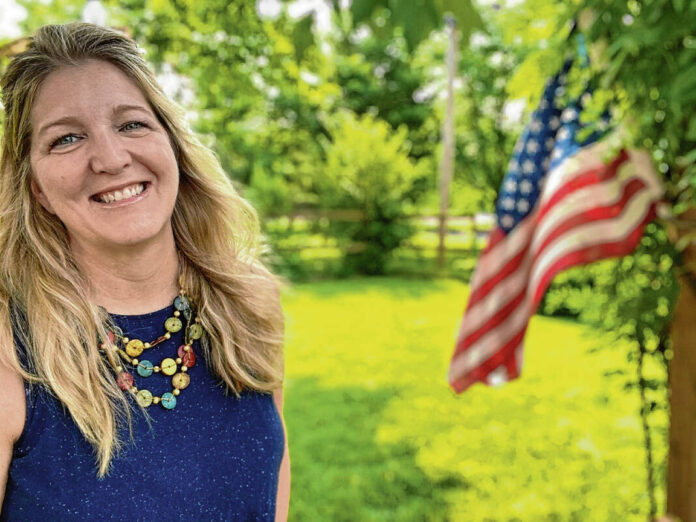
U.S. Army veteran Kelly Kramer is a Columbus counselor whose practice’s patients are comprised of 30 to 40 percent fellow veterans. “Let the veteran be heard. Let them talk,” she advises friends or family members of a service member in need.
The Republic file photo
Military veterans and current service members share a bond. Whether they have worked hand in hand while in uniform or are shaking hands when meeting for the first time, shared experiences from military life start conversations and forge friendships among people whose identities are sewn into shoulder patches.
That’s especially helpful when they find themselves navigating a tough patch in life.
Having served herself as an Army pilot for two decades, Columbus mental health counselor Kelly Kramer understands the military culture and has been able to build connections when veterans and service member need a trusted ear the most.
Kramer, who operates Waypoint Counseling and Consulting, specializes in treating individuals with trauma, anxiety and insomnia. Although she assists adults with mental health needs in the general community, about 30 to 40 percent of her clients are military veterans or service members.
That’s not by chance.
Three years after leaving military service, Kramer started graduate school at IUPUC with a strong desire to help veterans and others with trauma. She completed her training and earned a Master of Arts in Mental Health Counseling degree in 2014.
“For me, it was a spiritual connection — my faith for the next steps in my life. A lot of prayer went into it,” said Kramer, who long had an interest in psychology.
Her first five years post-college were spent as a civilian aeromedical behavioral health professional for the Indiana National Guard at Camp Atterbury from 2014 to 2018. Aeromedical psychology is the application of clinical psychology principles, methods and techniques to address individual and group issues within the aviation community.
Kramer launched her one-person private practice as a licensed mental health counselor Jan. 1, 2019, when she began welcoming clients into her California Street office.
There’s a long list of reasons military people are reluctant to seek mental health help when they are having a tough time navigating life. Among them:
- Personal embarrassment about service-related mental disabilities
- Long wait times to receive mental health treatment
- Shame over needing to seek mental health treatment
- Fear of being seen as weak
- Stigma associated with mental health issues
- A lack of understanding or lack of awareness about mental health problems and treatment options
- Logistical problems, such as long travel distances to receive this type of care
- Concerns over the veteran mental health treatment offered by the Veterans Administration
- Demographic barriers and false perceptions based on these demographics such as age or gender
Getting needed treatment from the Veterans Administration can be a huge barrier, as is getting help paying for mental health services. Not all counselors accept TRICARE, a health insurance program for military members, their dependents, retirees, some survivors and former spouses.
In addition, current service members with mental health issues can also face anxiety over possibly facing medical discharge — losing their job and the ability to provide for their family, she said.
“If they’re contacting me, they’ve already made the first step, probably because I’m a veteran,” Kramer said. “There’s a very deliberate effort to let them know we are the same. I understand some of the challenges they have. I’ve rarely had a military member quit on me once they’ve started.”
One of the biggest issues for people who have served in the armed forces is coming through post-traumatic stress disorder.
Recovery from PTSD after experiencing severe trauma or a life-threatening event while serving is a gradual, ongoing process, according to HelpGuide.org, a nonprofit online resource for military veterans. Veterans and service members can take steps to help them cope with residual symptoms of PTSD and reduce their anxiety and fear.
While many veterans never fully escape the impacts of PTSD, whose origins are military-related, it is possible — through therapy — to rediscover inner joy, peace and happiness, Kramer asserts.
“Absolutely,” she said.
Unfortunately, Kramer’s patient schedule has become maxed out. When veteran slots open up again, she will be able to take on more veteran or service member clients.
However, other capable mental health counselors serving the Columbus area are accepting new patients — good news for potential military clients. And even through these trained specialists may not have military experiences themselves, that doesn’t discount their ability to help, Kramer said.
“I’m just one,” she said.
For people who need treatment for depression or anxiety, there are plenty of local mental health counselors who can treat them if they have military competency, Kramer said.
However, she said veterans with PTSD and other forms of trauma need to see a mental health professional who uses evidence-based treatment, as Kramer does. Fewer of these resources are available locally, she said.
Kramer enlisted in the military because she wanted to fly helicopters.
After joining the Army National Guard in her home state of Michigan in 1987, Kramer had to wait two years for a slot to open in fight school at Fort Rucker, Alabama. She graduated from the two-year program in 1990.
When Kramer joined the military, women weren’t allowed to fly aircraft in combat. That breakthrough came in 1993, two years after Operation Desert Storm, the American-led liberation of Kuwait from Iraqi occupation during the Persian Gulf War.
Kramer served 20 years in the military, including active duty from 2000 to 2004, but never in combat. However, she was deployed in Haiti for six months in 1995-1996, flying UH-1H Huey helicopters. She was later deployed to Kosovo in 2001 and served during 9/11, when she flew Black Hawk helicopters.
Kramer was an instructor pilot and did pilot an AH-1F Cobra attack helicopter, although not in combat zones. She was also a maintenance test pilot.
With such experiences, she has worn the same boots as some of her counseling clients – and knows how to help when they become overwhelmed in life, feel disconnected to others or have feelings of depression.
“Let the veteran be heard. Let them talk,” Kramer advises friends or family members of a service member in need.
“Listen, and then make a plan to move forward,” she said.
Make a mental health appointment, call a crisis line or do research online – and do it collaboratively, she said.
“Their story is important. It’s important for them to have choice when moving forward,” the counselor said.




